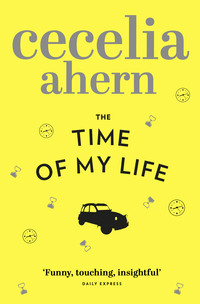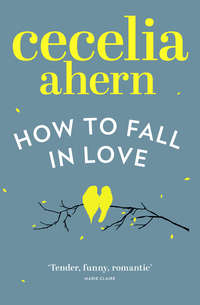
Полная версия
Roar
They married, she quit her job, nursed her children, cuddled them, spent sleepless nights caring for them on the shelf, then watched them sleep, gurgle and grow on the rug and playpen beneath her. Ronald liked for her to be alone on the shelf, he employed childcare so that she could have her space, so that she could stay in the place he built for her, so that he wouldn’t lose a part of her to the children, or that their special relationship wouldn’t be altered. She had heard of couples who were torn apart after having families, husbands who felt left out when babies arrived. She didn’t want that to happen, she wanted to be there for him, to still feel adored. The shelf was her place. She cared deeply for everyone from there, and because of her position in the home, everyone always looked up to her. It was only later, when the children had grown up and left the house, twenty years after the day she first climbed onto the shelf, that the loneliness took hold of her.
With the suddenness of an alarm bell, in fact.
It was the angle of the TV that started it. She couldn’t see what Ronald was watching. It had never bothered her before because she was always content to see the faces of her children watching television rather than the TV itself. But the couch was now empty, the room quiet, and she needed distraction, escapism. Company. Ronald bought a new television, a flat screen that went on the wall, which meant it couldn’t be tilted, and it was suddenly out of her view, just as her children were. And then there were the gatherings Ronald organized without inviting her or telling her, that would go on around her, involving people she had never met, and some women she wasn’t sure of, right there in her own home – under her very nose, as it were.
She watched from above as his life carried on beneath her, as though she wasn’t in the room, as though she wasn’t a part of his life. Wearing a smile to hide her confusion, she would try to cling on, she would try to join in, but they couldn’t hear her up there on the shelf and they’d grown tired of looking up, of raising their voices. They’d moved on. Ronald would forget to top up her drink, to check on her, to introduce her. It was as though he’d forgotten that she was there. And then he built the extension; it took him months, but once he was finished and the kitchen extended out to the back garden, suddenly all the gatherings and dinners moved out there. The TV room that had been the formal room, the centre of their home, was now a small, comfortable den. It had lost its grandeur. She’d reached the point where she felt she wasn’t a part of his life any more.
And now it’s Saturday night, and she’s been alone all day while he’s been out golfing, while the children are busy getting on with their own lives.
‘Ronald,’ she says.
He’s on the couch, watching something that she can’t see. He makes a sound in response but doesn’t look up at her.
‘Something doesn’t feel right up here.’ She hears the tremble in her voice, feels the tightness in her chest. When you put me up here, it was for everybody to see me, to be the centre of everything, but now … now everything is carrying on without me, out of sight. I feel so disconnected. She can’t say it, the words won’t come. Even thinking this way scares her. She likes her shelf, she is comfortable on her shelf, the shelf is her place, it’s where she has always been, it is where she should always stay. He put her there to remove all the concerns and responsibilities of life from her, for her.
‘Do you want another pillow?’ he asks. He chooses a pillow beside him and throws it to her. She catches it and looks at it and then at Ronald in surprise, heart pounding, things inside her hurting. He stands up then.
‘I can buy you a new one, a bigger one,’ he says, silencing the television with the remote control.
‘I don’t want a new pillow,’ she says quietly, taken aback by her response. Usually she loves such things.
It’s as though he doesn’t hear her, or perhaps he does and he ignores her. She can’t figure it out.
‘I’m going out for a few hours, I’ll see you later.’
She stares at the closed door, listens to the car engine start up, in utter shock. It’s been building up slowly over the years, but this is her moment of realization. All the little signs come together and hit her now, almost knocking her from her perch. He’d placed her on this shelf, a cherished woman whom he adored and wanted to protect and showcase, and now that everyone has seen her, has admired her, has congratulated him on his achievements, there’s nothing left. Now she’s just part of the furniture, a shelf adornment like the rest of his trophies, tucked away in an old comfortable den. She can’t even remember the last Dusting Day; how long has it been since he took her down to polish her?
She is stiff. She realizes this for the first time. Her body needs to move. She needs to stretch. She needs room to grow. She’s spent so many years sitting up here representing an extension of Ronald, of his achievements, that she no longer has any idea what she represents to herself. She can’t blame Ronald for this; she willingly climbed up onto this shelf. She was selfish in lapping up the attention, the praise, the envy and the admiration. She liked being new, being celebrated, being his. But she was foolish. Not foolish to think it was a beautiful thing, but foolish to think it should be the only thing.
As her mind whirs, the pillow that she has been hugging for comfort falls from her hands and lands softly on the floor. It makes a soft pfft on the plush carpet. She gazes at it on the floor and as she does, another realization dawns.
She can get off the shelf. She can step down. She’d always had the ability to do that, of course, but somehow it seemed her place, the natural place to be, and why would anybody leave their place to become displaced? Her breath quickens at the dangerous new thought, dust catches in her throat and she coughs, hearing a wheeze in her chest for the first time.
She has no place gathering dust. She lowers herself down. One foot on the armchair beneath, where Ronald used to sit holding her feet in his hands while he watched TV – until the new flat screen was installed. She reaches out to the wall to steady herself. The brown trout is the only thing she can grasp. Her stockinged foot slips on the armrest of the chair. Her hand flies out in panic, searching for something to cling to, and grips the open mouth of the trout. Under her weight, the trout swings on the wall. It has only been hanging on by one nail all these years. So precarious. Something of such importance, you’d have thought her husband would’ve secured it better. She smiles at the thought. The trout swings off the nail and as she places faith in the armchair, falling into it, she watches the trout fall from the wall and land on the cabinet beneath. It smashes the glass cabinet, home to the football and golf trophies. Crash, smash, it all comes tumbling down. Then there’s silence.
She giggles nervously, breaking the silence.
Then she slowly lowers one foot to the floor. And then the other. She stands up, feels her stiff joints crack. The floor she has watched for so long, that is so familiar to her eye, feels unfamiliar beneath her feet. She wriggles her toes in the plush carpet, plants her feet in its fibres, truly roots herself in this new surface beneath her. She looks around the room and it seems so alien to her now that her view is different.
And suddenly she feels compelled to do something with her new life.
When Ronald returns from the pub he finds her with a golf club in hand, his best driver. His football and golf trophies lie on the floor, covered in broken glass. The brown trout looks up at him from the mess with its dead eyes.
‘It was too dusty up there,’ she says, breathless, as she swings again at the wooden shelf.
It feels so good, she takes another swing.
The wooden shelf splinters, bits fly everywhere. She ducks. He cowers.
As Ronald slowly peels his arms away from his face, she can’t help but laugh at his shocked expression.
‘My mother used to keep all her fancy handbags in dustcovers. She stored them in her wardrobe, saving them for special occasions, but they stayed there until the day she died. All those beautiful cherished things, never seeing the light of day, because even the rare special occasions in her life weren’t deemed exceptional enough. She was always waiting for something more extravagant to come along, instead of wearing them on her arm to brighten her every day. She would tell me I didn’t appreciate things enough, that I should cherish my possessions more, but if she was here now I would tell her that she’d got it all wrong. She should have appreciated the everyday things that she had, realized their value, made the most of them. But she didn’t; she locked the potential away.’
Ronald’s mouth opens and closes without any words coming out. He looks like his framed trout that has smashed to the floor.
‘So,’ she swings at the wall again and declares firmly, ‘I’m staying down here.’
And that was that.

The doctor said it was hormonal. Like the random hairs that had sprouted from her chin after the birth of her babies, over time the bones of her back had begun to protrude from her skin, stretching out from her spine like branches of a tree. She has chosen not to go for the X-ray her doctor suggested, nor has she heeded his bone density and osteoporosis warnings. It isn’t a weakening she feels in her body, it is a growing strength, spreading from her spine and arching across her shoulders. In the privacy of their own home, her husband traces the line of her bones on her back, and when she is alone she strips naked and stands before the mirror to study her changing body. Sideways on, she can see the shape that is emerging beneath the flesh at her shoulders. When she ventures outside, she is thankful for the hijab that falls loosely over her shoulders, hiding this mysterious growth.
She would feel fearful of these changes in her body were it not for the immense strength swelling within her.
She has not been in this country long, and the other mothers at the school watch her even though they pretend otherwise. The daily gathering at the school gate that intimidates her. She finds herself holding her breath and increasing her pace as the gates come into sight; lowering her chin and averting her eyes, she squeezes her children’s hands tighter as she delivers them to their classrooms. The people in this nice town think of themselves as polite and educated, so there are rarely any comments made, but they make their feelings known through the atmosphere they create. Silence can be as threatening as words. Conscious of sidelong stares and uneasy silences, she pushes through the tension while the town quietly makes plans and draws up regulations that will make it more difficult for a woman like her to be in a place like this, for a woman who looks like her to dress as she does in a place like this. Their precious school gates. The gates protect their children and these mother-clusters are the guardians of those children. If only they knew how much they have in common with her.
Even if it’s not those mothers who are pushing through paperwork to make life difficult for her and her family, it is people like them. And the men they share their beds with at night. Perhaps, after their rounds of tennis and pots of tea, they shower and go to their offices to implement rules, stop refugees and immigrants from entering their country; these good people, these cappuccino-drinking, tennis-playing, coffee-morning fundraisers who care more about book weeks and bake sales than human decency. So well-read they start to see red when the alien invasions in their fiction start to manifest themselves in real life.
She feels her son watching her as they walk; their son of war, as her family called him, born into war, in a life consumed by pain on all levels: economically, socially, emotionally. Her anxious boy, always so uptight, always trying to look ahead and sense what terrible thing can happen next, what terrifying, degrading thing his fellow humans can surprise him with, the jack-in-the-box cruelty of life. He is always readying himself, rarely able to relax and revel in the joys of being a child. She smiles at him, trying to forget her woes, trying not to send those negative messages through her hand to his.
It’s the same story every weekday morning, and again at collection time; her anxiety gets the better of her and her son of war senses it. Then again at the supermarket when she is on the receiving end of an insulting comment, or when her highly qualified engineer husband is trying to politely convince someone he is capable of so much more than sweeping streets and every other menial job he scrapes by with. She heard a rumour once that the mosques in Canada do not face Mecca, that they are a few degrees off. Distressing, to say the least; but she can go further than that, she has a theory that the world’s axis is off too. If she could, she would fly up into space and fix the axis of the world, so that it would spin fairly.
Her husband is grateful for everything they get, which only fuels her fury. Why should they be so grateful for the things they work so hard for, as if they were pigeons pecking at crumbs tossed on the ground by passers-by?
She rounds the corner with her little girl and boy and the school is in sight. She readies herself, but her back is throbbing. It has been aching all night, despite her husband’s gentle massages; she’d waited until he’d fallen asleep then moved to the floor so as not to disturb him. Though it throbs and aches constantly, there are times when the pain levels escalate. She’s noticed it grows more intense whenever the fury rises within her, when things get her so angry she has to fight the urge to reach out and rattle the world, give it a good shake.
At her husband’s insistence, she’d gone to the doctor about the changes in her back. It had been such a waste of money for so little insight that she refused to go for a follow-up appointment. They need to save what little money they have for emergencies. Besides, the throbbing and aching reminds her of how she’d felt during her two pregnancies; it’s not the pain of deterioration but of life blooming inside her. Only this time the new life her body is sustaining is her own.
She straightens up, but her back feels heavy and she’s forced to hunch over again. The school gate is in sight now, surrounded by clusters of mothers, standing around talking. There are some kind eyes, of course there are; she gets one hello, one good morning. Some eyes don’t register her at all, they rush past, preoccupied with keeping to their stressful schedule, lost in thought, making plans, trying to catch up with themselves. Those people don’t offend her. It is the others. The cluster. The tennis bags on their backs, the white skirts stretched over their plump bottoms and gym leggings, flesh squished at the seams, squeezed so tight it is trying to find a way out. That group.
One notices her. Lips barely move as she speaks. The discrimination ventriloquist. Another set of eyeballs. And then another. Some more ventriloquism, less talented this time. The whispers to each other, the stares. This is the daily reality of her picked-over life; she’s observed in everything she does. She’s not from here, she could never change that, she doesn’t want to be like them, she doesn’t want to be part of their cluster, and they distrust her for that.
She is late this morning and she is angry with herself. Not because her children will be a few minutes late, but because she is arriving during the most dangerous minutes. The mothers, having delivered their children to their classes, now mill around the gates, heads together, making plans, organizing collections, playdates, parties that her children will not be included in. She can see no way of getting to the school without walking by them, but they are a large group and the path is narrow and so she would either have to squeeze by the wall, walking single file with her children, or by the cars, brushing up against the dirty SUVs. Or through them. She could go through them. All of those things would mean drawing their attention, possibly having to talk.
She is angry with herself for hesitating, for the growing fear inside her at a small cluster of silly women. She didn’t flee from a war-torn country, leave everything and everyone she loves behind, for this. She didn’t sit on that overcrowded inflatable boat with nothing from their old lives except the clothes on their backs, while seawater sloshed at their feet threateningly, and her children trembled under her grasp. In the darkness. In silence. Hoping for the coastline to appear. To endure that and then to sit in a container, in the dark, with no air, and not enough food, the stench of their waste in a bucket in the corner, and the fear in her heart – not for the first time – that she had sealed her children’s fate, that she had dug their graves with this decision. She didn’t go through all that so that she could be stopped in her tracks by these women.
The throbbing in her back intensifies. It spreads from her lower spine all the way to her shoulders. Shooting pain, that aches but also brings a strange relief. Like contractions during labour, coming and going but building in intensity all the time, powerful waves of super strength.
As she nears the women, they stop talking and turn to her. They are blocking the path, she will have to ask them to move aside. It is childish, but it is real. The pain in her back is so intense it prevents her from speaking. She feels the blood rushing to her head, her heartbeat loud in her ears. She feels her skin straining on her back, tightening. She feels as though she will be torn open, just as when her babies were born. And it is because of this she knows that life is coming. She lifts her chin, she straightens up, she looks the women directly in the eye, not afraid, not intimidated. She feels immense power, immense freedom, something these women don’t understand – and how could they? Their freedom has never been threatened, they have no experience of how effective war is in turning men, women and children to ghosts, in turning the mind into a prison cell, and liberty to a taunting fantasy.
The skin on her back is taut now and she can feel the fabric of her black abaya stretching and stretching. Then there’s a ripping sound and she feels air on her back.
‘Mama!’ her son says, looking up at her wide-eyed. ‘What’s happening?’
Always anxious about what’s next. She delivered him to freedom but he is still in custody, she sees it in him every day. Not so much her daughter, who is younger and adapted more easily, though both will forever see all life through the gauze of truth.
The abaya rips completely and she feels a violent surge from behind, as she’s pulled upward. Her feet leave the ground with the force of it, then land again. She takes the children with her.
Her son looks fearful, her daughter giggles. The women with the tennis bags look at her in shock. Beyond them she sees a lone woman, hurrying away from the school, who stops and smiles, hands to her mouth in surprise and delight.
‘Oh, Mama!’ her little girl whispers, letting go of her hand and circling her. ‘You grew wings! Big beautiful wings!’
The woman looks over her shoulder and there they are: majestic porcelain-white feathers, over a thousand of them in each wing, she has a seven-foot wingspan. By tensing and untensing her back muscles she discovers that she can control her wings, that all this time her body was working in preparation for flight. Her primary wings are at the tips of her fingertips. Her daughter squeals with delight, her son clings to her tightly, wary of the women staring at them.
She relaxes her muscles, folds her wings closer to her body and wraps them around her children, cocooning them. She lowers her head and huddles with them – it is just the three of them, wrapped in white warm feathery delight. Her daughter giggles. She looks at her son and he smiles shyly, surrendering to this miracle. Safety. The elusive treasure.
She slowly opens her wings again, to their full grand span, and she lifts her chin in the air, feeling like an eagle on top of the highest mountain. Proud, reclaimed.
The women still block the path, too shocked to move.
The woman smiles. Her mother once told her, the only way to the end is to go through. Her mother was wrong; she can always rise above.
‘Hold on tight, my babies.’
She feels their trusting grips tighten around her hands; they cannot be torn apart.
Her wingspan is enormous.
Those little hands gripping hers are all the motivation she needs. Everything was always for them. Always has been, always will be. A better life. A happy life. A safe life. Everything they are entitled to.
She closes her eyes, breathes in, feels her power.
Taking her children with her, she lifts upwards to the sky, and she soars.

She sits on the bench in the park every weekday at lunchtime, the same bench, the same park, beside the lake. The wooden bench is cold beneath her. She curses, stands, pulls her coat down lower over her rear end and sits again, the padding protecting her a little more. She unwraps her ham-and-cheese baguette and spreads the tinfoil open over her lap. A squished tomato oozes beneath the bread, causing it to become soggy. This tips her over the edge.
‘Fucking shitty motherfucking tomato.’
She could tolerate her intolerable colleagues at work. She could tolerate the disgusting man on the bus beside her this morning who picked his nose for the entire trip and rolled his snot on the balls of his fingers as if she couldn’t see him. But the tomato. The fucking tomato is the icing on the cake. She’d only wanted cheese and ham and this unwanted addition has turned her bread to mush, leaving the cheese squished and stuck to the bread as though it’s all one gooey substance.
‘Bastard tomato,’ she grumbles, throwing the entire baguette on the ground. The ducks can have it.
Every lunch hour she visits the city park. Her office is nearby. Stocks, trading, asshole colleagues. This bench is the quietest, it is set away from everybody else. She comes here to feed the ducks and as she does she mumbles about the people who piss her off. She vents her frustrations over her fuckwit boss, her delusional colleagues, the turbulent stock markets. Feeding the ducks is her punchbag.
Most of her colleagues go to the gym on their lunch breaks, run off their issues for forty-five minutes and return to their desks cocksure and smelling of active shower gel and deodorant, and throbbing with testosterone. She prefers the fresh air, the peace, no matter what the weather. She needs to grumble and rant, and with every piece of bread she throws, a problem is eliminated and a little of the frustration ebbs away. Only, she’s not too sure it works – sometimes she finds herself getting worked up into a seething frenzy as her head fills with all the things she should have said – valid points and arguments she should have made back in the office.
She stares at the lump of soggy bread roll she has thrown on the ground. A few ducks fight over it, peck at it, but ultimately it falls well short of the all-out battle she’d thought it would spawn, which only goes to prove how unappetizing the baguette is.
‘You should have broken it up into pieces,’ a male voice interrupts her thoughts. She looks up and around with surprise. There’s nobody there.
‘Who said that?’
‘Me.’
Her eyes fall upon a mallard, standing away from the other ducks that are pecking at the bread roll, and each other.
‘Hi,’ it says. ‘I’m guessing by the look on your face that you can hear me.’









